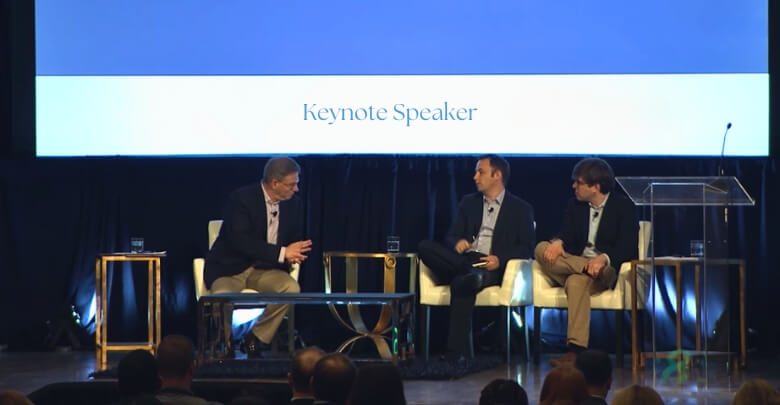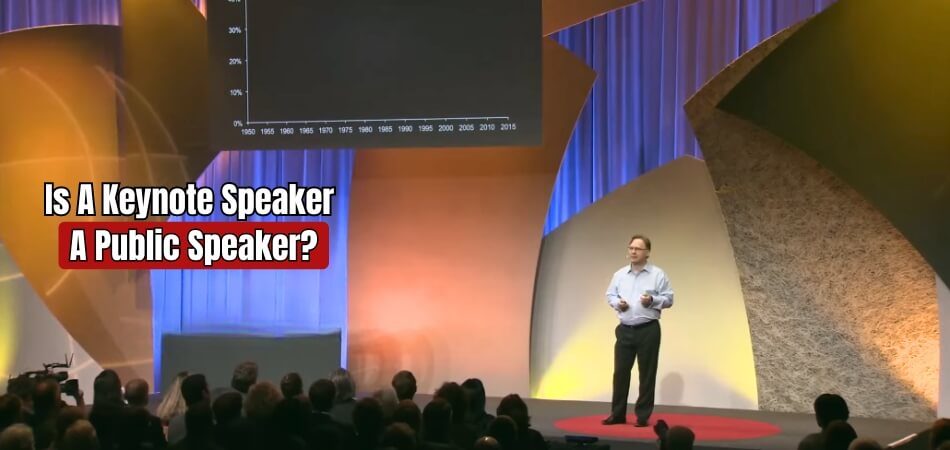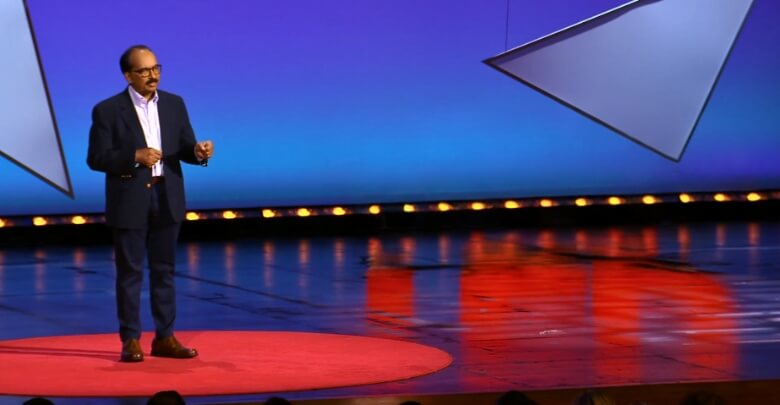Speaking at conferences brings a great opportunity to connect with audiences, share insights, and influence perspectives. But when it comes to event roles, many wonder: Is a keynote speaker a public speaker? This question often pops up, especially as both play distinct parts in impactful events.
Yes, a keynote speaker is indeed a type of public speaker, yet their purpose and approach differ significantly. Keynote speakers hold a primary role, often setting the event’s tone and delivering insights tied to the central theme. Their speeches are carefully crafted to inspire, motivate, and leave a lasting impression on attendees, shaping the gathering’s overall atmosphere.
Curious to dive deeper into this topic? Discover the nuances that set keynote speakers apart, explore their unique roles, and see how they promote events with every word. This article covers all you need to know about the vital role keynote speakers play.
What’s the Role of a Keynote Speaker?
A keynote speaker brings energy and insight to an event, setting the stage for the theme. They engage the audience, delivering key messages that align with the event’s goals. Their role includes offering individual perspectives and motivating the audience, which makes the session memorable and impactful for everyone.

With great expertise, keynote speakers often use storytelling and humor to make complex ideas easy to grasp. Their role goes beyond simple lecturing; they interact with listeners, leaving a lasting impression. This ensures attendees remain connected and curious about the broader topics being discussed at the event.
Keynote speakers usually join notable conferences to participate in discussions that inspire ideas and growth. They introduce fresh viewpoints, sparking meaningful conversations among participants. Their insights can influence perspectives, helping individuals and organizations find actionable strategies and feel motivated to implement positive change.
Who Are Keynote Speakers?
Keynote speakers are the main voices at events, delivering speeches that set the event’s tone and inspire the audience. They bring valuable ideas and make the event more memorable.
- Inspiring Voices: Keynote speakers are known for sharing powerful messages that motivate and connect with audiences on a personal level.
- Experts in Their Fields: They are skilled professionals chosen for their knowledge, adding depth and credibility to the event’s main topics.
- Fresh Ideas: Often leaders in their areas, introduce new trends, ideas, and insights that help audiences think about the future.
- Audience Connectors: Using storytelling and humor, they create a bond with the audience, making their speeches more engaging and impactful.
- Event Anchors: Their speeches provide structure to the event, giving direction and focus to what follows in other sessions.
- Networking Boosters: They bring people together, creating an atmosphere that encourages conversation and connection among attendees.
- Memorable Speakers: Their words often stay with the audience, sparking thoughts and actions even after the event ends.
Keynote speakers are not just presenters but dynamic influencers who shape the event’s tone and drive its impact. Their role is to uplift, inform, and leave an indelible mark on attendees, enriching the event experience.
Is a Keynote Speaker a Public Speaker?
Keynote speakers and public speakers both share stages, but their roles differ in purpose, impact, and approach. Each type of speaker plays a unique role in events, bringing specific insights and objectives to their presentations. Taking a closer look at the differences:
Purpose and Goals
A keynote speaker is often chosen to inspire, motivate, and set the overall tone of an event. They deliver messages that align with the event’s core themes. Public speakers, on the other hand, may cover a broader range of topics without the need to anchor an event’s theme. The keynote speaker’s message has a clear purpose, guiding the direction of the entire gathering.
Depth of Message
While both types aim to engage, keynote speakers dive deep into their topic, offering layered insights. They connect their content directly to the event’s core theme. Public speakers can deliver content in various ways, sometimes focusing on entertainment, education, or simply sharing knowledge. Keynote speakers, however, prioritize depth and relevance.
Audience Connection
Keynote speakers often establish a connection by addressing the audience’s expectations and emotions directly. They consider the event’s objectives and speak directly to the audience’s needs. Public speakers, although connecting with audiences, may have a wider scope, without focusing as strongly on one overarching message.
Experience and Expertise
Keynote speakers are often highly experienced or recognized in their fields, providing credibility and authority. Audiences trust their perspectives and insights, expecting guidance and inspiration. Public speakers can vary more in background, with a range of experience levels and topics that may not always align with a single area of expertise.
Impact and Influence
Keynote speakers aim to make a lasting impression, often leaving audiences with something to think about or act on. Their goal is to create a memorable, inspiring experience that stays with the audience. Public speakers may focus more on delivering information or entertainment, with less emphasis on long-term impact.
Event Role
Typically, keynote speakers play a central role, often opening or closing an event with their speech. They help structure the event, giving it direction and cohesion. Public speakers may participate at various points without having the same anchoring role or responsibility.
Preparation and Customization
Keynote speakers spend time preparing customized content that fits the event’s theme, audience, and goals. They consider their speech’s impact carefully, ensuring it aligns with what the event aims to achieve. Public speakers may prepare differently, sometimes covering general topics without the same level of event-specific customization.
Speakers provide memorable experiences and set the tone for events with their distinctive purpose, impact, and expertise. Their role, while related to public speaking, holds distinct qualities that contribute to the event’s overall atmosphere and objectives.
How to Build Your Reputation as a Keynote Speaker?
As a keynote speaker, you need to be focused, credible, and always trying to get better. Developing skills, gaining visibility, and offering your value can help you stand out and secure more speaking opportunities. Here are essential steps to develop your reputation:
Define Your Unique Voice
A unique voice is essential for a speaker. Identifying the messages and themes that you feel passionate about lets you communicate authentically. Consistently using this voice in your speeches helps audiences recognize your brand, making your message more memorable and impactful.
Improve Your Speaking Skills
The process of improving speaking skills never ends. Practice engaging storytelling, dynamic delivery, and audience connection to maximize your impact. Strong skills make audiences remember you, increasing your chances to get booked as a keynote speaker for future events.
Build an Impressive Portfolio
Creating a portfolio showcasing your past speeches, topics, and audience feedback can highlight your expertise. Sharing videos, testimonials, and written content about your experiences helps organizers see your value. An impressive portfolio can boost your visibility and credibility as a speaker.
Network with Industry Leaders
Developing relationships with other industry professionals is very beneficial. Networking with industry leaders, event organizers, and fellow speakers expands your reach, opening doors for speaking engagements. These connections increase the likelihood of receiving invitations for high-profile events.
Engage on Social Media and Online Platforms
Building a strong online presence is essential in today’s world. Engaging on social media platforms and sharing your knowledge regularly lets people know about your expertise. An active online profile can make it easier for event organizers to find and consider you for speaking opportunities.
Becoming a successful keynote speaker involves dedicated effort to improve skills, expand your network, and showcase your expertise. Building a strong reputation can help you reach more opportunities, opening doors to inspiring events and audiences.
The Unique Skills of a Keynote Speaker
A keynote speaker possesses special skills that captivate audiences, drive messages home, and leave a lasting impression. Developing these abilities requires focus and experience, allowing speakers to handle audience interactions effectively. Here are some of their core skills:
Engaging Storytelling
Storytelling is a powerful tool that creates a strong connection with listeners. Using relatable stories, examples, and humor makes complex topics more approachable. These storytelling techniques transform content into memorable experiences, making the message resonate more deeply with audiences.
Mastery of the Subject
A strong knowledge of the subject matter is essential for delivering a compelling keynote. Deep knowledge allows speakers to address audience queries smoothly, showing both confidence and credibility. This expertise reinforces trust and adds authority to their message.
Adaptability on Stage
Any effective keynote speaker must possess the ability to adapt. Each audience is unique, and speakers must adjust their delivery based on reactions, energy, and engagement. This flexibility helps maintain the connection, ensuring that every presentation feels personalized and impactful.
Powerful Stage Presence
It is important to maintain attention on stage by displaying a confident stage presence. Speakers who project energy, engage with body language, and maintain eye contact create a dynamic experience. This presence makes audiences feel involved, increasing the message’s impact and leaving a stronger impression.
Skillful Audience Interaction
Engaging with the audience in meaningful ways enhances both connection and participation. A key aspect of this is addressing audience questions for keynote speakers effectively, ensuring a smooth and comfortable interaction. By encouraging this kind of engagement, speakers make the audience feel acknowledged, heard, and valued.
The unique skills of a keynote speaker go beyond delivering a speech. Their ability to connect, adapt, and respond skillfully to audience dynamics makes them effective communicators, leaving a memorable impression on every audience they address.
FAQs About Is a Keynote Speaker a Public Speaker?
Curious about the role of a keynote speaker and how it compares to public speaking? Here are answers to some frequently asked questions that will help clarify the distinctions and provide insights into the unique responsibilities of keynote speakers.
What Qualities Make A Keynote Speaker Stand Out?
A keynote speaker stands out for their expertise, engaging storytelling, and ability to connect with audiences. Unlike general public speakers, they are chosen for their subject knowledge and the impact they can bring to an event. Their presence can energize, motivate, and set the tone for a memorable experience.
Are Keynote Speakers Always Industry Experts?
While keynote speakers often come from respected backgrounds in specific fields, they aren’t always industry experts. Some may have unique perspectives or stories that align with the event’s theme. However, experience and credibility in relevant topics help them create a strong impression and enhance the audience’s trust.
How Do Keynote Speakers Prepare Differently?
Keynote speakers invest significant time in customizing their content to match the event’s theme and goals. They focus on creating a cohesive message that resonates deeply with attendees. Unlike other speakers, keynote speakers align their content more directly with the overall purpose of the event, enhancing audience engagement.
Do Keynote Speakers Only Deliver Inspirational Messages?
No, keynote speakers don’t limit themselves to just inspirational messages. While inspiration is often a goal, they also aim to inform, challenge, and engage. Their speeches might include actionable insights, trends, and thought-provoking ideas, making their role diverse and adaptable to the event’s broader objectives.
Can A Keynote Speaker Handle Any Type Of Audience?
Keynote speakers are usually skilled at adapting to different audiences, tailoring their approach to match attendees’ expectations. They often research their audience beforehand to ensure relevance. This ability to adapt helps them resonate with various groups, setting them apart from general public speakers who may stick to a single style.
End Note
The role of a keynote speaker is vital in shaping the atmosphere and impact of an event. Their ability to engage audiences with inspiring and informative content sets them apart from other speakers. This distinction highlights their unique contributions to various gatherings.
To answer the question: Is a keynote speaker a public speaker?—yes, they are. However, keynote speakers focus on setting the event’s tone and delivering impactful messages that align with the central theme. This targeted approach enhances their role beyond typical public speaking engagements.
As you explore the world of keynote speaking, remember to focus on honing your storytelling skills, understanding your audience, and preparing tailored content. These tips can help you succeed in any speaking engagement. Best of luck with your career as a speaker!







